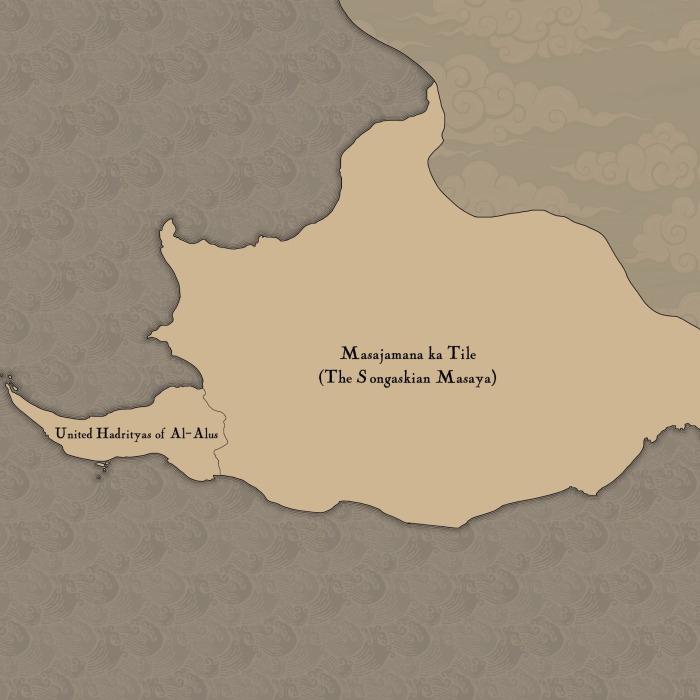More actions
m Removed redirect to Farah'deen Tag: Removed redirect |
No edit summary |
||
| Line 1: | Line 1: | ||
This page is a sub-page of the [[Geography]] page which records all major regions of the [[Aloria]]n world and explains roughly what each nation or area is like. Farahdeen, also called Ard-al Nur, is roughly east of [[Corontium]], home to the [[Qadir Ailor]] and [[Songaskia]], and has a deep, complex history. Some of these pages may be tied to more expansive lore, which is linked within their respective table rows. Below is a piece of the Geography map cut out to show the relation between all the nations geographically. | |||
<center> | |||
[[File:Eastlands2.png]] | |||
</center> | |||
{| class="wikitable" | |||
{| style="background-color:#4A8757; width: 75%;" align="center" | |||
|- style="text-align:center;" | |||
! style="background-color:#C9D8CC; width:170px;" | Name | |||
! colspan="2" style="background-color:#C9D8CC;" | Description | |||
|- | |||
| style="text-align:center; width:15%; background-color:#efefef;" | | |||
'''Masajamana ka Tile''' | |||
[[File:noimg.png|250px]] | |||
| colspan="2" style="background-color:white;" | | |||
The great and powerful state of Masajamana ka Tile, also called the Songaskian Masaya, nominally rules most of Farahdeen. Founded by the Koné Dynasty of the Songaskian people within several decades of their first emergence before the Cataclysm (and currently ruled by Masaya Musamansa Koné), the state rapidly expanded and took over the deserted cities of the Qadir’s Sariyd Empire, their decimation a result of the Great Storm that preceded the birth of the Songaskia. While initially focused on conflict and warfare, seeking to own all of Farahdeen in the name of the Dragons the Songaskians worshiped, the Masaya eventually retreated from this philosophy. The state did become a rival and enemy to the Regalian Empire, resulting in two recent wars in 302 and 305 AC, though relations have gradually improved to a point of neutrality as the Songaskians instead devote themselves to other pursuits. The great state’s territory is extremely barren, with the only arable land located around a dozen or so Pearl Cities, great coastal bastions built by the Sariyd but now densely populated by the Songaskia (with a few others located inland). The rest of what the Masaya claims are great, thunderous mountain ranges, oasis specks, and ceaseless tracts of sand, alongside any ruins within such harsh terrain. Their border to the south, with Al-Alus, is a place of stagnation, where mindless Necroservants risen from the bones and flesh of other dead beings (for the Songaskia cannot conventionally die) ceaselessly combat the machines of the Qadir. | |||
*For more on the Songaskia, read [[Songaskia]]. | |||
|- | |||
| style="text-align:center; width:15%; background-color:#efefef;" | | |||
'''United Qasr of Al-Alus''' | |||
[[File:noimg.png|250px]] | |||
| colspan="2" style="background-color:white;" | | |||
The United Qasr of Al-Alus is the great Qadir state that survives in Farahdeen today and controls all of the Al-Alus Peninsula in a great united government. Not ruled by a single leader, but a technocratic council made up of experts and leaders from the range of Qasr across the area, the state formed after the Great Storm. Survivors in the two Pearl Cities at the fringe of Sariyd territory, Al-Alus, and Istiniyye, actively sought out and welcomed their now refugee brothers and sisters from nearly ravaged regions. But then the Songaskia came, pursuing the caravans of devastated people, and further devastation took place. Eventually, the machine strength of the Qadir allowed for a stable border to be created, and Al-Alus became the new capital of the remaining Qadir. It took up the mantle of leadership for their people, contacting the other Qasr across Aloria to inform them of the Great Storm, and to seek aid in the form of knowledge to help them fight this new foe. That fight has carried on ever since, and the Qadir have slowly recovered their numbers in the centuries since the cataclysm that befell their world. Less sandy than the rest of Farahdeen, the region of Al-Alus was once rich with mineral resources, but eventually mined away to nothing by the Qadir efforts to supply themselves with war material. There remain plentiful oases, as well as arid, though still tenable land, in places. The region is dotted with over a hundred Qasr, serving both as towns and connecting waystations across their land, and rarely serving their purpose as seen in the broader world as locations where the Qadir hoard technology. Instead, they seek to survive, using ancient stores of knowledge in their homeland, and those developments found abroad which are transmitted back to aid this technocracy. | |||
*For more on the Qadir, read [[Qadir]]. | |||
*For more on Sariyd History, read [[Sariyd History]]. | |||
|- | |||
|} | |||
Revision as of 22:24, 18 February 2024
This page is a sub-page of the Geography page which records all major regions of the Alorian world and explains roughly what each nation or area is like. Farahdeen, also called Ard-al Nur, is roughly east of Corontium, home to the Qadir Ailor and Songaskia, and has a deep, complex history. Some of these pages may be tied to more expansive lore, which is linked within their respective table rows. Below is a piece of the Geography map cut out to show the relation between all the nations geographically.
| Name | Description | |
|---|---|---|
|
The great and powerful state of Masajamana ka Tile, also called the Songaskian Masaya, nominally rules most of Farahdeen. Founded by the Koné Dynasty of the Songaskian people within several decades of their first emergence before the Cataclysm (and currently ruled by Masaya Musamansa Koné), the state rapidly expanded and took over the deserted cities of the Qadir’s Sariyd Empire, their decimation a result of the Great Storm that preceded the birth of the Songaskia. While initially focused on conflict and warfare, seeking to own all of Farahdeen in the name of the Dragons the Songaskians worshiped, the Masaya eventually retreated from this philosophy. The state did become a rival and enemy to the Regalian Empire, resulting in two recent wars in 302 and 305 AC, though relations have gradually improved to a point of neutrality as the Songaskians instead devote themselves to other pursuits. The great state’s territory is extremely barren, with the only arable land located around a dozen or so Pearl Cities, great coastal bastions built by the Sariyd but now densely populated by the Songaskia (with a few others located inland). The rest of what the Masaya claims are great, thunderous mountain ranges, oasis specks, and ceaseless tracts of sand, alongside any ruins within such harsh terrain. Their border to the south, with Al-Alus, is a place of stagnation, where mindless Necroservants risen from the bones and flesh of other dead beings (for the Songaskia cannot conventionally die) ceaselessly combat the machines of the Qadir.
| ||
|
The United Qasr of Al-Alus is the great Qadir state that survives in Farahdeen today and controls all of the Al-Alus Peninsula in a great united government. Not ruled by a single leader, but a technocratic council made up of experts and leaders from the range of Qasr across the area, the state formed after the Great Storm. Survivors in the two Pearl Cities at the fringe of Sariyd territory, Al-Alus, and Istiniyye, actively sought out and welcomed their now refugee brothers and sisters from nearly ravaged regions. But then the Songaskia came, pursuing the caravans of devastated people, and further devastation took place. Eventually, the machine strength of the Qadir allowed for a stable border to be created, and Al-Alus became the new capital of the remaining Qadir. It took up the mantle of leadership for their people, contacting the other Qasr across Aloria to inform them of the Great Storm, and to seek aid in the form of knowledge to help them fight this new foe. That fight has carried on ever since, and the Qadir have slowly recovered their numbers in the centuries since the cataclysm that befell their world. Less sandy than the rest of Farahdeen, the region of Al-Alus was once rich with mineral resources, but eventually mined away to nothing by the Qadir efforts to supply themselves with war material. There remain plentiful oases, as well as arid, though still tenable land, in places. The region is dotted with over a hundred Qasr, serving both as towns and connecting waystations across their land, and rarely serving their purpose as seen in the broader world as locations where the Qadir hoard technology. Instead, they seek to survive, using ancient stores of knowledge in their homeland, and those developments found abroad which are transmitted back to aid this technocracy.
| ||

